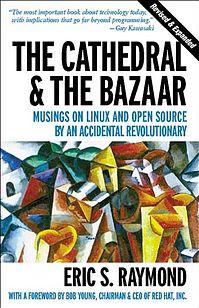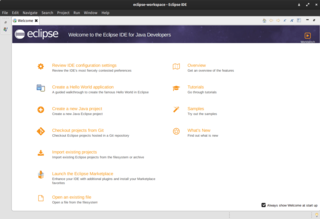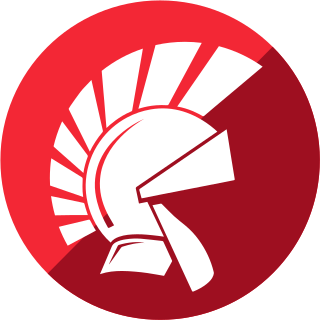Freeware is software, most often proprietary, that is distributed at no monetary cost to the end user. There is no agreed-upon set of rights, license, or EULA that defines freeware unambiguously; every publisher defines its own rules for the freeware it offers. For instance, modification, redistribution by third parties, and reverse engineering are permitted by some publishers but prohibited by others. Unlike with free and open-source software, which are also often distributed free of charge, the source code for freeware is typically not made available. Freeware may be intended to benefit its producer by, for example, encouraging sales of a more capable version, as in the freemium and shareware business models.

The Cathedral and the Bazaar: Musings on Linux and Open Source by an Accidental Revolutionary is an essay, and later a book, by Eric S. Raymond on software engineering methods, based on his observations of the Linux kernel development process and his experiences managing an open source project, fetchmail. It examines the struggle between top-down and bottom-up design. The essay was first presented by Raymond at the Linux Kongress on May 27, 1997 in Würzburg (Germany) and was published as the second chapter of the same‑titled book in 1999.
AIBO is a series of robotic dogs designed and manufactured by Sony. Sony announced a prototype Aibo in mid-1998, and the first consumer model was introduced on 11 May 1999. New models were released every year until 2006. Although most models were dogs, other inspirations included lion cubs, huskies, Jack Russell terriers, bull terrier, and space explorers. Only the ERS-7, ERS-110/111 and ERS-1000 versions were explicitly a "robotic dog", but the 210 can also be considered a dog due to its Jack Russell Terrier appearance and face. In 2006, AIBO was added into the Carnegie Mellon University Robot Hall of Fame.
DB, dB or db may refer to:

Eclipse is an integrated development environment (IDE) used in computer programming. It contains a base workspace and an extensible plug-in system for customizing the environment. It is the second-most-popular IDE for Java development, and, until 2016, was the most popular. Eclipse is written mostly in Java and its primary use is for developing Java applications, but it may also be used to develop applications in other programming languages via plug-ins, including Ada, ABAP, C, C++, C#, Clojure, COBOL, D, Erlang, Fortran, Groovy, Haskell, JavaScript, Julia, Lasso, Lua, NATURAL, Perl, PHP, Prolog, Python, R, Ruby, Rust, Scala, and Scheme. It can also be used to develop documents with LaTeX and packages for the software Mathematica. Development environments include the Eclipse Java development tools (JDT) for Java and Scala, Eclipse CDT for C/C++, and Eclipse PDT for PHP, among others.

Delphi is a general-purpose programming language and a software product that uses the Delphi dialect of the Object Pascal programming language and provides an integrated development environment (IDE) for rapid application development of desktop, mobile, web, and console software, currently developed and maintained by Embarcadero Technologies.
Test-driven development (TDD) is a way of writing code that involves writing an automated unit-level test case that fails, then writing just enough code to make the test pass, then refactoring both the test code and the production code, then repeating with another new test case.
PAD written in all-caps, such as in an acronym, may refer to:

Dangerous goods (DG), are substances that when transported are a risk to health, safety, property or the environment. Certain dangerous goods that pose risks even when not being transported are known as hazardous materials. An example for dangerous goods is hazardous waste which is waste that has substantial or potential threats to public health or the environment.
Multi-licensing is the practice of distributing software under two or more different sets of terms and conditions. This may mean multiple different software licenses or sets of licenses. Prefixes may be used to indicate the number of licenses used, e.g. dual-licensed for software licensed under two different licenses.

Aptana, Inc. is a company that makes web application development tools for use with a variety of programming languages. Aptana's main products include Aptana Studio, Aptana Cloud and Aptana Jaxer.
In computing, code generation denotes software techniques or systems that generate program code which may then be used independently of the generator system in a runtime environment.
The goal of most research on group development is to learn why and how small groups change over time. To quality of the output produced by a group, the type and frequency of its activities, its cohesiveness, the existence of group conflict.
A programming team is a team of people who develop or maintain computer software. They may be organised in numerous ways, but the egoless programming team and chief programmer team have been common structures.

Object-oriented programming (OOP) is a programming paradigm based on the concept of objects, which can contain data and code: data in the form of fields, and code in the form of procedures. In OOP, computer programs are designed by making them out of objects that interact with one another.

Sparx Systems Enterprise Architect is a visual modeling and design tool based on the OMG UML. The platform supports: the design and construction of software systems; modeling business processes; and modeling industry based domains. It is used by businesses and organizations to not only model the architecture of their systems, but to process the implementation of these models across the full application development life-cycle.





